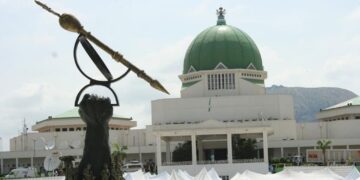[ad_1]
FOLLOWING latest revelations that if the Ways and Means Advances from the Central Bank of Nigeria (CBN) to the Federal Government are securitised, Nigeria’s total public debt stock may hit N77 trillion, analysts have said that the country is heading towards debt trap which will eventually lead to further downgrade of sovereign ratings and negatively affect the country’s trading partners.
According to Patience Oniha, Director-General of the Debt Management Office (DMO), the country’s debt has already crossed the N44 trillion threshold in September 2022 and immediately after the National Assembly approves the securitisation of the CBN’s Ways and Means, the amount would be added to the national debt.
Nigeria’s debt stock is set to hit about N77 trillion with the addition of the N22.7 trillion loans from the CBN to the Federal Government as well as new borrowings billed for 2023.
The country’s debt profile hit N44.06 trillion in the third quarter of 2022 from N39.56 trillion at the end of 2021, data from DMO shows.
In the words of a public affairs analyst, Kalu Aja, “If you do business with the Nigerian government or lend to the Nigerian government or do business in Nigeria, or trade with the markets in Nigeria, your entity will be downgraded because of the Nigerian government’s debt trap.”
It should be recalled that Moody’s Investors Service downgraded Nigeria’s local currency and foreign currency long-term issuer ratings as well as its foreign currency senior unsecured debt ratings to B3 from B2, placing them on review for further downgrade.
Also, in November 2022, Fitch Ratings downgraded Nigeria’s Long-Term Foreign-Currency Issuer Default Rating (IDR) to ‘B-’from ‘B’. The Outlook is Stable.
Then they downgraded the eight largest Nigerian banks as well as Dangote Cement, Seplat and one of the largest independent owners, operators and developers of shared telecommunications infrastructure, IHS Towers.
“When you are downgraded, your cost of borrowing goes up, meaning Nigeria will pay more to borrow.
“The more Nigeria borrows, the more your taxes go up. Also the borrowing causes spending to rise, leading to inflation,” Aja tweeted.
Accumulating debt has always been frowned upon. Nonetheless, there may be situations when one has no option but to incur debt.
But, whatever the situation, experts believe it is best to avoid taking multiple lines of credit.
Not over-utilising credit limits is vital to ensure corporates and sovereigns don’t fall into a debt trap. Finance experts describe a debt trap as a situation where a borrower is forced to take on new loans simply to repay existing ones. In essence, a debt trap occurs when debt obligations surpass one’s loan repayment capacity.
However, if equated monthly installments (EMIs) are not paid on time, the interest on the outstanding amount would keep increasing and may include late payment penalties. This keeps inflating overall debt.
ALSO READ FROM NIGERIAN TRIBUNE
[ad_2]






